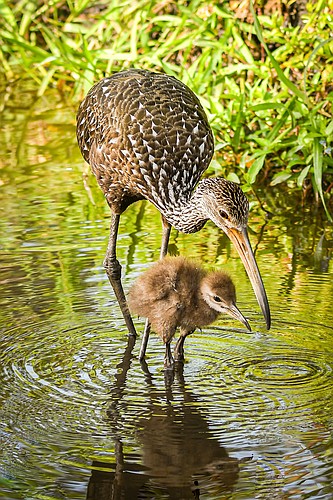- December 27, 2024
-
-
Loading

Loading

It is springtime in Wild Florida: Delicate native flowers are popping up, seemingly everywhere, as are wildlife babies, including adorable, long-legged limpkin chicks.
Limpkins are named for the way they seem to limp while walking across uneven wetlands. Because they were easy to catch or shoot, these loquacious birds were nearly extirpated from Florida due to hunting. Laws and conservation efforts prevented this from happening, and their population recovered.
But with nearly half of Florida's wetlands lost during the last century from development and wetland drainage, limpkin habitats have been greatly reduced. Heavy accumulations of non-native plants (mainly hyacinths and cattails) in foraging areas, which prevent them from being able to locate food, are also a concern, as is deteriorated water quality.
As a specialist species, limpkins have a limited diet and strict habitat requirements. Florida was once the northern range for these tropical wetland birds, as well as for apple snails, their primary prey. Indeed, limpkin bills are bent and twisted at the tip, in an impressive adaptation for easily removing the snails from their shells. Interestingly, the introduction of an invasive species of apple-snail, which is harmful to our delicate wetland ecosystems, has expanded limpkin range. Because the invasive snails are more tolerant of cold, they've rapidly spread north. And limpkins followed, as far as Louisiana.
Protected lands, such as Myakka River State Park, are critical for the survival of many of our native species, which, in turn, are critical for the health of our Florida ecosystems. To keep Wild Florida healthy, we should avoid introducing non-native species into our environment. And we can also help wildlife by respecting their space and not further interfering with their homes and well-being. This is especially critical when they are feeding or tending to their young.
So when observing or photographing wildlife, please remember (and remind others) to keep a respectful distance and be mindful of your impact on them. If you are changing an animal's behavior through your presence (by distracting or causing them to move or fly to get around or away from you), please move away.
Friends of Myakka River exists to support Myakka River State Park and the Wild and Scenic Myakka River. Together, we're protecting and sharing Myakka's Magic, to the benefit of future generations, and our own.